Admin
Gunfire heard around Kano emir’s palace
Gunfire was on Monday night reported around the mini palace where the deposed Emir of Kano, Aminu Ado Bayero, is staying in Nasarawa GRA of the state capital.
The palace is located about 300 metres to the Kano Government House where movement of vehicles is restricted to one portion of the road leading to Tarauni.
The emir’s palace, which has been witnessing a buzz of activities, is under survellance by a combined security team.
On Sunday, armed hunters at the main Emir’s palace where the reinstated Emir Lamido Sanusi is staying, tried to attack some protesters calling on Kano governor to obey a court order restraing it from removing Mr Ado-Bayero.
The hunters relented because of the presence of the security agents at the palace.
Some residents and passerby suspected that the gunshots were fired to discourage any attempt to arrest Mr Ado-Bayero after a state High court ordered his eviction from the palace on Monday.
A resident of the area told PREMIUM TIMES some commuters diverted their route in fear that the palace was under attack.
“Have you heard what is happening at the Aminu Ado Bayero palace? My wife just called me now that there is heavy gunfire at the Emir’s palace and they don’t know what’s going on there. The gunfire has been coming from the direction of the palace,” a resident of the area asked PREMIUM TIMES.
“People heading to Ahmadu Bello Way are said to be changing their routes but we don’t know what is actually happening,” the resident said.
It was not immediately clear whether the gunshots were from security agents or palace guards.
Both the Kano State police commissioner, Muhammad Gumel, and the command’s spokesperson, Haruna Kiyawa, could not be reached on phone to comment on the incident.
The development followed a court order by the Kano State High Court ordered to evict the dethroned Emir Mr Ado Bayero, from his palace.
The state high court on Monday ordered Mr Ado-Bayero and his four colleagues in Bichi, Rano, Gaya and Karaye Emirates to stop parading themselves as emirs.
The court issued the interim injunction pending the hearing and determination of the motion on notice filed by the Kano State Attorney General and Commissioner for Justice, the Speaker, Kano State House of Assembly, and the Kano State House of Assembly.
[Premium Times]
The amendment of the CBN Act may pose great risk to the economy – Analysts
The move to review the Central Bank of Nigeria Act 2007 by the National Assembly may erode the powers of the apex bank, water down its policies, and endanger the country’s economy, analysts polled by BusinessDay have said.
They noted that though the excercise will act as checks and balances to the CBN, it may send negative signals to investors, adding that having an independent central bank remains the accepted practice across all major world economies.
Muda Yusuf, an economist and chief executive officer of the Centre for the Promotion of Private Enterprise stated that the amendment Act will pose a great risk to the independence of the central bank.
“The CBN deserves its autonomy to shield it from undue interference from its activities. Too much interference will affect the quality of the economic policies emerging from the CBN as well as its personnel,” Yusuf said.
He explained that the independence enjoyed by the central bank is part of the reasons why investors are confident in positioning their businesses in the country, stressing that the problem is not really about the law but those that would be appointed to occupy certain positions upon amending it.
Citing the gross violations of the Act under the former governor of the CBN, Godwin Emefiele, the CPPE boss said if the laws are not rightly amended, the apex bank could easily be compromised.
“Whether the law is from the National Assembly or the Judiciary, once the CBN is compromised, a lot of things will go wrong,” he said.
Adeola Adenikinju, a professor of Economics and the President of the Nigeria Economic Society (NES) said the amendment of the 2007 Act will potentially erode the CBN’s independence, which could be detrimental to the nation’s economy.
“I have no doubt that the review of the CBN Act 2007 by the National Assembly will weaken the independence of the central bank,” he said.
“The central bank won’t be able to play effective monetary policies roles, even investors who contribute to the economy want to ensure that the central bank has the autonomy to make certain monetary decisions,” he added.
The University of Ibadan don said while the review is aimed at promoting transparency within the country’s apex bank, it will create more harm than good.
Adenikinju stressed that the conversation should bother around the total implementation of the 2007 Act rather than reviewing it.
The bill, sponsored by Tokunbo Abiru, a Lagos Senator and co-sponsored by all 41 members of the Senate Committee on Banking, Insurance and Other Financial Institutions is expected to make certain changes in the organizational structure of the Abuja-based bank.
Key aspects of the legislation the lawmakers are seeking to amend include the establishment of a 7-member coordinating committee for monetary and fiscal policies to be chaired by the minister of finance.
The tenure of the CBN governor and deputy governors upon the review will be set at a single non-renewal term of six years .
Also, it will see to the appointment of a minimum of one career staff of the bank in the committee of governors and appointment of at least one female among the external directors.
In addition, the bill is seeking to establish the position of chief compliance officer in the rank of a deputy governor, who reports directly to the board and may occasionally be summoned to appear before the relevant committee of the National Assembly.
Furthermore, the bill proposes that the CBN governor appears on a semi-annual basis whilst the National Assembly in the exercise of its constitutional duties should reserve the power to invite the governor to make presentations from time to time as need arises.
It also proposes publishing a monetary policy report and an interim financial report every six months, where the governor fails to make a report to the president and the National Assembly as required by law, he should be served with a warning letter by the National Assembly.
And if the failure persists, by a recommendation from the National Assembly, the governor will be suspended from office by the President, among others.
“Reviewing the CBN Act of 2007 could lead to potential changes in the central bank’s mandate, governance structure, monetary policy tools, and regulatory framework,” a source familiar with the matter said.
“The amendment could put too much political interference in economic matters. This could impact the economy, financial stability, and the central bank’s independence,” the source added.
“While some of the proposed amendments to the CBN Act are commendable as they were designed to entrench the culture of compliance, strengthen corporate governance, and reposition the bank for improved performance in attaining its mandate, some others could erode the bank’s autonomy and weaken the independence of monetary policy, at variance with international best practices,” a university professor who doesn’t want to be mentioned said.
[BusinessDay]
Major Scandals That Have Rocked Nigeria’s Democratic Journey Since 1999
After years of struggle characterised by wanton arrests, imprisonment, and assassinations of pro-democracy activists, Nigeria finally returned to the path of democratic governance on May 29, 1999.
This gesture, which drove the military back to the barracks and ushered in a new dispensation, is most often referred to as Nigeria’s fourth republic. This has so far been the longest civilian rule without inference from the military since Nigeria’s independence in 1960. The journey has, however, not been smooth. The trajectory has witnessed some controversies that were weathered by the sheer will of Nigerians to strengthen their nascent democracy. Below are some of the major scandals that have rocked the democratic journey since 1999.
SALISU BUHARI AND HIS TORONTO CERTIFICATE
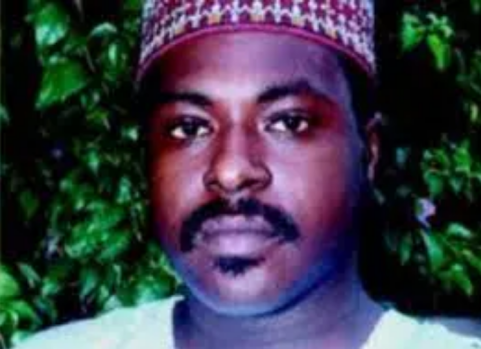
With barely two months into the inauguration of the 1999 set of House of Representatives members, the Green Chamber was rocked by a scandal that is arguably still one of the most daring and barefaced incidents involving a political officeholder in Nigeria.
Ibrahim Salisu Buhari, the young lawmaker from Kano State who had emerged as the Speaker of the House, was exposed to have not only falsified his age, but also presented bogus academic credentials.
According to The News Magazine, which unearthed the scandal, Buhari had claimed that he obtained a Bachelor of Science in Business Administration from the University of Toronto, Canada, in 1990; a diploma in accountancy from Ahmadu Bello University (ABU), Zaria, in 1988; and that he served under the National Youth Service Corps (NYSC) in 1991. Again, Buhari was said to have been born on January 3, 1963.
But it later emerged that Salisu Buhari was actually born on January 3, 1970, making him 29 years old at the time he contested and won election to the House, whereas the constitution pegs the age limit for a member of the House at 30. It was also revealed that he actually got admission into ABU, but he was withdrawn because he falsified his credentials.
Again, available records at the time showed that he never went to the University of Toronto in Canada and did not take part in NYSC, according to The News Magazine.
Though he initially denied the allegations, the revelation that the federal government had concluded plans to prosecute him forced his hand as he tendered his resignation as speaker and member representing Nasarawa federal constituency on July 22, 1999, exactly 49 days after his election.
OBASANJO’S THIRD-TERM POLITICAL AMBITION
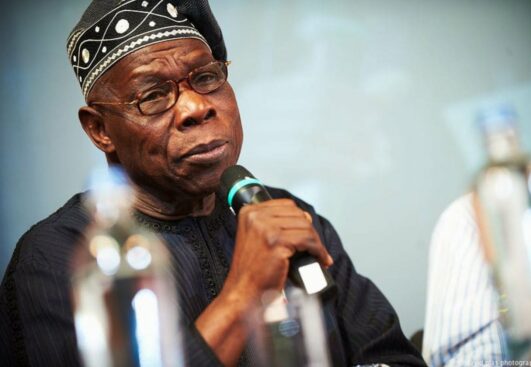
During the twilight of the administration of President Olusegun Obasanjo’s second term in office, Nigeria’s political scene was thrown into pandemonium when the National Assembly was considering a move to change the constitution to allow the president to contest for a third time.
While the former president denied he ever nursed the ambition of ruling the country for another four years, the event showed the readiness of Nigerians to safeguard the democracy attained through blood and sweat.
Ken Nnamani, the Senate President at the time (2006), said at the public presentation of his book, “Standing Strong: Legislative Reforms, Third Term, and Other Issues of the 5th Senate,” that by adjourning the senate in the course of the constitutional amendment process, some senators in support of the bill had a change of mind after interacting with their constituents.
He added that the live transmission of the plenary on May 16, 2006, when an alteration of the constitution to allow three terms for Nigeria’s presidents was being considered, forced some senators to abandon support for the bill.
Years later, the report of some lawmakers being given cash in ‘Ghana-must-go’ bags to vote in favour of the bill remained a major taint on the National Assembly.
2007 PRESIDENTIAL ELECTION

With the third-term presidential attempt of Obasanjo defeated, the elections that brought his predecessor, the late Umaru Musa Ya’ardua, into power were considered the worst in Nigeria’s history.
The conduct of the election made the European Union observers label it as “the worst they had ever seen anywhere in the world, with rampant vote rigging, violence, theft of ballot boxes, and intimidation.”
Apart from this submission, the inability of the INEC to adequately plan for the election threw the process into chaos, with voting commencing in some parts of the country around 5 p.m. on election day due to the late arrival of materials.
Before the election, the INEC did not include the name of Obasanjo’s embattled Vice President, Atiku Abubakar, among the presidential candidates, but the Supreme Court ruled against it a week before the election.
After the election, Ya’ardua proclaimed the election flawed and promised to enact new laws that would strengthen the electoral process.
IMBROGILO OVER JONATHAN’S STATUS IN YAR’ADUA’S ABSENCE
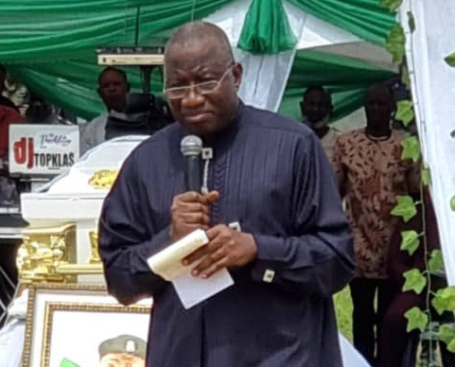
Perhaps one of the most challenging periods in Nigeria’s democratic journey was when then President Umaru Musa Ya’ardua took ill and was flown to Saudi Arabia for treatment without formally handing over to his deputy as envisaged by the constitution.
His absence in the country for 10 weeks stalled governance, which prompted the National Assembly to make his vice president, Goodluck Jonathan, the acting president, a move that was opposed by members of Yar’adua’s cabinet.
The act was termed by the then Senate President, David Mark, as the “doctrine of necessity due to a lack of constitutional precedent.”
Before the solution by the National Assembly, the polity had been heated up along both religious and ethnic lines, with many from the southern part of the country where Jonathan comes, interpreting the power play as a strategic agenda to deny the South-South the opportunity to govern the country.
PATRICIA ETTEH
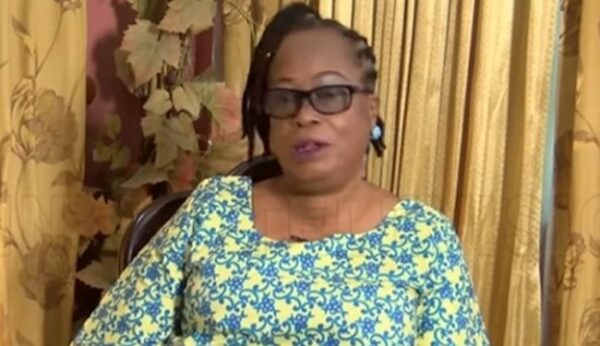
On June 6, 2007, Patricia Etteh became Nigeria’s first female Speaker of the House of Representatives. But the trained hairdresser and beauty therapist, who later became a lawyer, had one of the shortest tenures as the number four citizen of Nigeria.
Two months after her emergence, accusations of corruption were raised against her. She was made to face an ad hoc committee over accusations that she had authorised the spending of N628 million on renovations of her official residence and that of her deputy, and the purchase of 12 official cars meant for the House of Representatives.
During one of the committee’s sittings where she had appeared to defend herself, chants of ‘Thief!’ ‘Thief!” in Yoruba were directed at her, with the session degenerating into a commotion with the lawmakers descending into a free for all. She was eventually escorted out by the security men, and on October 30, 2007, after weeks of pressure, she resigned. Her deputy, Babangida Nguroje, also resigned.
FUEL SUBSIDY AND FAROUK LAWAN’S JOURNEY TO JAIL
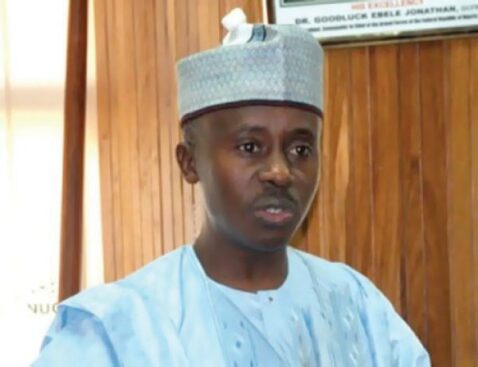
In 2012, the House of Representatives’ ad hoc committee set up to probe petroleum product subsidies came up with the finding that the government overpaid some markers to the tune of N229.7 billion between 2010 and 2011.
The chairman of the committee, Faruk Lawan, the soft-spoken Kano-born lawmaker who had made a name for himself as “Mr. Integrity,” submitted the report, which contained a list of companies that had ‘defrauded’ the government, on the floor of the House. But a few days later, he became enmeshed in a bribery scandal that would later make him an inmate at Kuje Custodial Centre. A video of him receiving and stuffing wands of dollar notes into his cap, ostensibly as a bribe from one of the marketers, emerged.
Almost 10 years later, Justice Angela Otaluka of the FCT High Court convicted him and sentenced him to seven years’ imprisonment for receiving a $500,000 bribe while serving as the chairman of the House’s ad hoc committee.
The court held that Lawan demanded $3 million and received $500,000 as a bribe from Femi Otedola, a Nigerian billionaire oil mogul, in 2012. The judge held that he took the bribe to remove Otedola’s oil company, Zenon Oil and Gas, from the list of firms indicted for fraud in the fuel subsidy regime. His sentence was later reduced to five years by the Supreme Court.
OCCUPY NIGERIA PROTEST
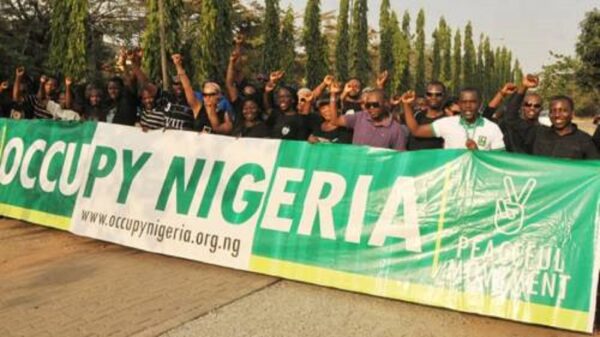
The Occupy Nigeria protest emanated from the decision of the government to remove the fuel subsidy, thereby increasing its cost from N65 per litre to N141.
The protest, which started on January 2, 2012, was a massive movement of Nigerians that nearly crippled the country’s economy as government workers and those in the private sector declared strikes to join the protest.
While the protest took on a political undertone as opposition parties took advantage of it, it served as an avenue for Nigerians to vent their anger over the continued rise in the cost of living and corruption in the country. The continued protest forced the government to lower the cost to N97.
RIOT AT THE NATIONAL ASSEMBLY
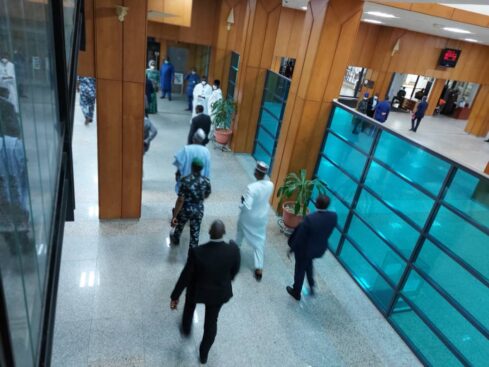
Following the defection of the then Speaker of the House of Representative, Aminu Tambuwal, to the main opposition party, security personnel blocked his access to the national assembly.
This led to chaos in the legislative arm of the country, resulting in a face-off between lawmakers and the police. The latter used tear gas to stop the lawmakers from gaining access to the complex.
With all access to the complex blocked, some of the lawmakers resorted to scaling the fence, while others forced the pedestrian gate open before Tambuwal gained access to the complex.
INVASION OF SENATE PRESIDENT, HIS DEPUTY’S RESIDENCES

In 2018, security operatives were used to intimidate the legislative body, especially the senate, which had been termed by the government as its main opposition.
The first was that of operatives of the DSS storming the residence of Senate President Bukola Saraki to effect his arrest. The arrest warrant was issued by the Inspector General of Police on the basis that he had some questions to answer due to his alleged connection to the perpetrators of the Offa robbery that claimed the lives of residents.
On the same day, the house of his deputy, Ike Ekweremadu, was barricaded by officials of the EFCC on the guise that he had some questions to answer on the case of money laundering.
While Saraki slipped through the arrest, his deputy was not so lucky.
The actions were believed to be a result of the planned defection of the Senate president with some other lawmakers.
Also, a siege was laid on the National Assembly complex by the DSS to prevent lawmakers from gaining access to their chambers in August. This followed the defection of the Senate president to the opposition party.
The aftermath led to the sack of the then-Director General of the DSS.
MACE THEFT
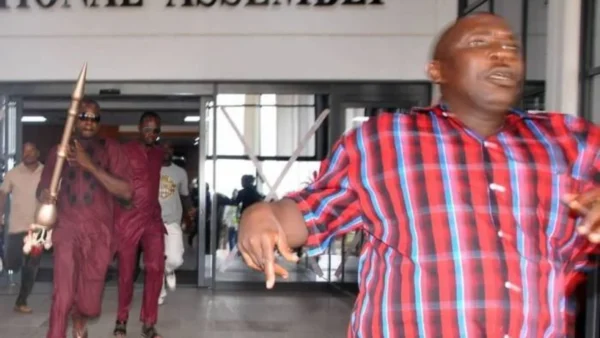
Still in 2018, the Senate was engulfed in drama when its mace was stolen by thugs who stormed the red chambers. While fingers were pointed at Senator Ovie Omo-Agege, who appeared in the chamber in the midst of his suspension, the Delta Central senator denied leading the thugs to the chamber to steal the mace.
According to the police, the mace was eventually found at the City Gate a day after it was stolen, and Omo-Agege was arrested for the theft. He was later released and would end up as the Deputy Senate President in the 9th Assembly.
ORUBEBE’S DISRUPTION OF 2015 ELECTION
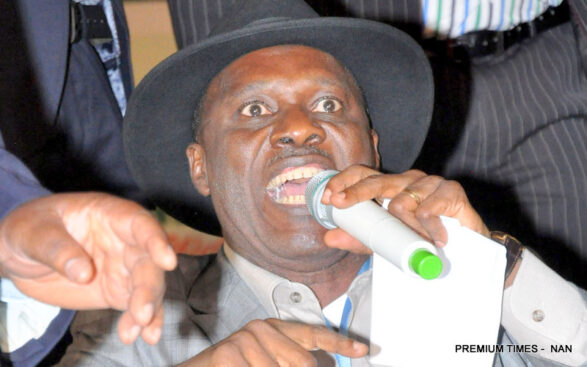
The 2015 election that brought popular opposition figure Muhammadu Buhari to power remains one of the most intriguing in Nigeria’s history, especially at the anti-climax that was witnessed at the collation centre.
While the election was adjudged one of the best and the incumbent conceded defeat even before the official declaration of Buhari as the winner, a former minister of Niger Delta Affairs and representative of President Goodluck Jonathan, Godsday Orubebe, disrupted the collation while making some allegations against the then INEC chairman, Prof. Attahiru Jega, when the former realised his principal would lose the election.
While Jega kept his cool during the drama, the antics of Orubebe, expected to stop the final declaration, will forever be etched in the minds of Nigerians.
[DailyTrust]
Transfer: I want to play for a bigger club – Nwabali hints at next move
Super Eagles goalkeeper, Stanley Nwabali, has dropped the biggest hint that he could leave Chippa United this summer.
Nwabali burst onto the scene at the 2023 Africa Cup of Nations in January this year.
The 27-year-old goalkeeper finished the competition with four clean sheets in seven appearances.
He also made two penalty saves in the shoot-out against South Africa in the quarterfinals.
This season, Nwabali has kept 11 clean sheets for Chippa United in 26 appearances.
Following his impressive performances, Nwabali has become a target for clubs abroad.
Saudi Pro League club Al Ettifaq, English Championship side Queens Park Rangers, and South African side Kaizer Chiefs have all been linked.
Following the final game of the season – a 2-0 defeat to Orlando Pirate – Nwabali dropped a hint on his future.
“Well, everyone would love to leave because when you are in some position, you need to grow,” said Nwabali.
“Like everyone in my position, I would like to grow more. I’m talking about clubs higher than this [bigger than Chippa United] because I have been giving my all to my club this season.
“I just wish to have another challenge at some other place,” Nwabali said.
[DailyPost]
How we fared in nine months, by Keyamo, Kyari
More ministers yesterday took turns to give an account of their stewardship since their inauguration on August 21, last year.
The ministers are Festus Keyamo (Aviation and Aerospace Development), Abubakar Kyari, Agriculture and Food Security and Sabi Abdullahi, Agriculture and Food Security (state).
The event tagged Ministerial Sectoral Press Briefing is being coordinated by the Information and Culture Ministry as part of activities marking the one-year anniversary of the Bola Ahmed Tinubu Administration. It started last week.
Keyamo revealed plan by the Aviation ministry to power the nation’s international airports with solar.
He explained that when implemented, the N1 billion that the Federal Government spends monthly on diesel to provide light at the Murtala Mohammed International Airport in Lagos alone would be saved.
Apart from announcing that the suspension of the controversial Air Nigeria project remained in force, Keyamo said that new master plans for the country’s airports and a review of the concession of four of them were likely.
He said: “We are making conscious and gradual efforts towards embracing eco-friendly practices which is what the world is about now. Eco-friendly practices and green technologies in line with the International Civil Aviation Organization (ICAO) standard on the long-term global aspiration goal of net-zero emissions in the aviation sector is what we are targeting.
“Lagos airport alone, I am told we do N1billion monthly on electricity and I said why? I am still trying to crack that. The first thing I told them to do is to bypass the DisCos and go to the GenCos because we are eligible users. So, why do we pay Disco that will add its own profit? So, we want to cut them off and go to the GenCos straight. We are doing that and those concerned are protesting and trying to meet Mr. President.
“By bypassing, we are saving 30 percent, so if we are supposed to pay N1billion, we will pay N700million in terms of consumption because unlike some other airports that we shut down by 6 pm, Lagos and Abuja airports are run 24 hours. All the international airports must run for 24 hours because of flights coming in internationally.
Keyamo justified the suspension of Air Nigeria project initiated by his immediate predecessor, Hadi Sirika, saying it was never meant to benefit the country and its citizens.
He said: “The Nigeria Air remains suspended, it was never Air Nigeria, it was Ethiopian Air trying to fly our flag. If it is so, why not allow our local airlines fly our flag, why bring in a foreigner to fly our flag?
‘’So, nobody should deceive you that it was Air Nigeria. Air Nigeria must be indigenous and wholly Nigeria or for the full benefit of Nigeria and not that 60 percent of the profit is for another country. How does that benefit us? So, it remains suspended.”
Sirika is currently being prosecuted by the Economic and Financial Crimes Commission over the Air Nigeria project.
The minister also revealed plans to improve the security situation at the airports and eliminate bureaucracy in the Aviation sector.
He added that plans were ongoing to eliminate touting and reduce the number of human contacts at the airports.
He said: “We have official and unofficial touts at the airports. Before you come out to meet the official touts, there are unofficial touts in uniform inside the airports who deep hands into your bags, and ask for money. They are not under the Ministry of Aviation but we have spoken with the Interior Minister and the National Security Adviser and we are going to work jointly and present a joint memo to try and reduce the human contacts at the airports. “‘’Some of the touts are armed. They(touts) cannot all continue to be lining up and embarrassing our country.’’
Keyamo added that his ministry recently agreed with its counterpart in Saudi Arabia to revive cargo flight operations.
“We are working towards reviving the long-dormant cargo flight between Nigeria and Saudi Arabia. This is targeted at enhancing bilateral trade and economic cooperation,” he said.
Govt injected N309b into dry season farming, says Agric Minister
Kyari said that N309 billion had been injected into the economy following the launch of dry season farming.
The minister who also stated that the ministry supported 107,429 wheat farmers with inputs resulting in an output of 474,628 metric tonnes, said that 42,000mt of assorted food commodities were released from the National Strategic Food Reserve to the National Emergency Management Agency (NEMA) for distribution.
He said the ministry distributed 58,500 metric tonnes of milled rice to all states and the Federal Capital Territory (FCT) to curb the escalating prices of the item.
The minister added that the ministry also established animal health centres and veterinary hospitals, six micro earth dams and eight boreholes, 164 milk collection centres, eight cottage feed mills, and seven livestock centres.
Kyari also said crops were fortified with Vitamin A micro-nutrients to enrich the nutrition content and health value of food commodities.
Among efforts to tackle the challenge, listed by him were, the distribution of 60,432 metric tonnes of improved seeds, 887,255 metric tonnes of seedlings, 138 value kits, 501,726 litres of agrochemicals, 62,328.5 metric tonnes of inorganic fertilisers, 1,000- kilogramme fungicide, and 33,200 equipment to farmers across different value chains.
Kyari also said there has also been an improvement of farmland security with the provision of additional resources to agro rangers and other security agencies.
He said: “We are fully aware of how to face the menace of portfolio farmers who have no farmland nor practice any agricultural production except to unfold their portfolios for all kinds of transactions from which they profiteer.
“One of the ways we have tried to defeat this is by ensuring the integrity of data of genuine farmers through the infusion of ICT(Information, Communication, and Technology) and active collaboration with subnational governments, traditional institutions, security agencies, and civil society organisations.’’
Minister of State for Agriculture and Food Security Abdullahi said efforts were in top gear to develop and feed and fodder industry for livestock in the country.
’Tinubu creating environment for media to thrive’
Information and Culture Minister Mohammed Idris, who moderated the session, said the Tinubu Administration had created an enabling environment for all the players in the media industry to thrive.
He advised stakeholders in the media ecosystem to come up with bankable proposals to access the Bank of the Industry single-digit loan.
Idris said: “We are creating an enabling environment for all players and stakeholders in the media and information ecosystem to thrive. One highlight here is the recent directive by Mr. President to the Federal Ministry of Industry, Trade and Investment, through the Bank of Industry (BOI), to extend its single-digit interest-rate financing to media organizations in the country.
“It is now incumbent upon media practitioners to develop bankable proposals to access this financing facility being offered by the Federal Government, and I hope that you the media will take full advantage of this great opportunity.”
On the sectorial briefing, Idris explained that the administration is resolute to restore trust in public communication
“Our objective here is to enlighten, inform, and educate Nigerians and the world, and to ensure that everyone is carried along through the provision of detailed, relevant, credible, and timely information.”
[TheNation]
Ronaldo breaks Saudi Pro League scoring record
Cristiano Ronaldo broke the record for the most goals in a Saudi Pro League season when he struck for the 34th and 35th time in Al Nassr’s final game of the campaign.
“I don’t follow the records, the records follow me,” the 39-year-old Portuguese forward tweeted afterward.
The former Real Madrid and Manchester United star struck in first-half stoppage time and again in the 69th minute with a header as Al Nassr defeated Al Ittihad 4-2 at home on Monday.
The previous record for most goals in a single season was the 34 scored by the Moroccan Abderrazak Hamdallah in 2018-19.
Al Nassr were already assured of a second-placed finish, coming a distant 14 points behind champions Al Hilal.
Ronaldo joined Riyadh-based Al Nassr in December 2022, the start of an influx of overseas players to the Saudi league on lucrative contracts.
Ronaldo, who led Portugal to victory at the 2016 Euros, has been selected for the squad for this year’s edition in Germany next month — his 11th international tournament.
He is the most capped player in men’s international football with 206 appearances and has scored a record 128 goals.
AFP
Labour, private sector operators bicker over minimum wage demand
…Organized Labour’s N497,000 demand unrealistic — Presidency
…Adds affordability key to arriving at any figure
President of the Nigeria Labour Congress, NLC, Mr. Joe Ajaero, and Managing Director of Financial Derivatives Company, Mr. Bismarck Rewane, at this year’s annual Vanguard Economic Discourse, traded words over Organised Labour’s N615,000 minimum wage demand which has been reduced to N497,000.
While Mr Rewane contended that the minimum wage being demanded by Labour was not feasible, Ajaero insisted that the demand is in line with the socio-economic realities of Nigeria at the moment.
This came as the Presidency yesterday said the N497,000 demand by Labour as the new minimum wage was unrealistic and advised labour to be serious in its demand.
Speaking in his opening remarks at the summit, Ajaero, who was a panelist at the discourse, posited that the prices of most essential items and other services from transportation, and electricity to food had skyrocketed.
He said: “From all that we have been discussing here, there is a benchmark which is the dollar; a common factor we use. The cost of living index determines the wages, I want you to benchmark it with probably a bag of rice, which is about N84,000 today.
“I will equally want you to ask people that refill their gas cylinders how much it costs them, maybe N16,000 or N17,000, and it is once or twice in a month which is about N30,000 plus. I would equally want you to benchmark it to a plate of ‘Mama-put’ (Roadside food vendor) at N500 without meat.
“When you do that, with a family of six, you are going to get N270,000 in a month. We can go on and on. I want you to equally look at the United Nations, UN, provision that no human being should live on less than $2 per day.
“For a family of six, that will amount to $12. Multiply it and it gives you $360, then convert it with the current exchange rate.
“Ordinarily, I would have asked you to convert this money to dollars and you will see that it translates to about $20 and that is the least all over the world.
“Do you want labour to suggest that people should live on less than $1, not even $2 per day?
‘Living wage different from minimum wage’
If you match that with Mr President’s position that he is going to give Nigerians a living wage, and a living wage, in actual fact is different from a minimum wage.
“A living wage is that which will keep you and your family, at least, for you to eat till the end of the month. The fact that you have so much devalued your naira to the point that it doesn’t have weight gain should not make us not feed or go to work and not come back.
“No worker, including those in this hall today, goes to work and back without spending at least N2,000 a day. In a month, it is N60,000. Now check all these things and see whether a worker earning N615,000 in a month will have one naira in savings.
“We deliberately did not put communication. We deliberately did not put tithe, we assume that a worker does not have parents in our calculation. That is what brought us where we are today on the issue and on the premise that it creates inflation, I disagree with you because inflation is already here with us.
“It is a real wage that grows the economy because when workers earn, they purchase. When you increase the purchasing power of workers, the economy will grow and you have proper productivity.
“In Ghana, they review wages annually. If inflation is maybe three per cent, it is factored into it. Even in the United Kingdom, it is based on the level of inflation that they adjust wages. Yes, it is an index. If we have three per cent, it will be self-adjusted for that year.
“Even if you give us N615,000 for the next five years, it will be meaningless because if you are one of the people who prescribed this, it is weighing heavily on us.”
During the panel discussion, the NLC President said: “We are talking about reserves. You cannot continue to talk about reserves when people are dying of poverty. What are you going to do with reserves? The purpose of any government is for the good of the people.
“Whether workers or ordinary citizens, if you are talking of reserves, saving money and economic policies that are forcing people into poverty, how do you reconcile it because one of the eight-point agenda of the President is to eradicate poverty?
‘’Again, by the time we came up with the issue of wage award for which they gave N35,000, an amount which is neither here nor there, we came up with some measures before the negotiation of minimum wage.
“We said can you adopt the Compressed Natural Gas, CNG, policy? The CNG issue came from us and we explained to them that the CNG option will help Nigeria and is eco-friendly.
In this option, if you are supposed to fill your car tank with N50,000 petrol, with N15,000, you will fill your tank if we apply CNG.
‘’If you do this, even with the cost of PMS then, the cost of transportation will go down and prices of other things will stop moving. However, the government preferred to have abortions before pregnancy.
“However, they said we prefer to deregulate and they removed the subsidy before looking at how to cushion the effect. One year later, that cushion has not come.
“We decided to adopt a palliative policy, that is what the government is in today. A government of palliatives, tell me of any other reform that is working. Even the palliatives they promised, they said it should be cash transfers to the most vulnerable. As of today, there has never been any cash transfer to anybody.
“You were talking of reserves; it looks like you are having a kind of situation where people are dying and you are keeping reserves. You did not mention the corruption figures in Nigeria in building reserves.
“Some of the reserves built in the past were looted. If you identify that point of having billions and billions being looted by people, you can’t build reserves in the face of corruption. It is not possible. That is one vital point. Now that oil prices are going up, you cannot continue to refine abroad. “The period you are supposed to make money for your growth from oil, you are just importing refined products because no refinery is working in Nigeria, nothing is functioning.
“It is like a theory of producing cassava in your farm and you sell cassava to buy an illegal product.
‘’Now, between the time this last subsidy was removed and now, is Nigeria not paying more money in subsidy? Now we have to face reality. For sloganeering, we have removed the subsidy, while we are paying more subsidy.
“We should tell ourselves the truth. You know, there is no need to talk about reserves when they are going to completely loot the reserves.
‘’We cannot quickly forget the Justice Okigbo commission report on $12.4 billion missing oil windfall and whatnot. In this country, even when they take a loan, the loan disappears. Why can’t we come out openly and discuss our problem? And look at the hitches which corruption is causing to proffer solutions.”
Rewane contends
On his part, Mr Rewane, also a panellist at the event, said: “In 2019, the original proposal we met when former President Mohammad Buhari called us, I could recall, was N18,000, and the discussion was around N24,000. I think we moved it to N30,000 after all negotiations.
“When we came up, he said, I don’t want any layoffs, I don’t want any inflation, I don’t want this, I don’t want that. But what do you want? That was not there.
‘’In any case, we were able to resolve the issue. The data is very clear. What we did, N30,000 was the minimum wage, which covers 10 per cent more than N30,000 that the civil servants got.
“The equivalent at that time was about $75. So, for any other person, if you are on N18,000, you get N30,000. If you are a permanent secretary, whatever it is, you get N10,000 more.
And the data is here, inflation in 2019 was 11.4 per cent. Inflation in 2020, the year after, came down to six per cent.
‘’So, you can see that even though there was a wage review, which went from N18,000 to N30,000, inflation actually declined to six per cent. So, it was well managed, anticipated, and the discussion was very thorough and it happened in the month of the election. The president signed on April 18th.
“If you now dollarise the minimum wage, because the inflation has already been factored in the exchange rate, you dollarise the income. If you use the dollar value, you must also then use U.S. inflation. You cannot use the dollar value and then use the Nigeria inflation because that means that I am paying you in dollars.
“You now use US inflation, which is at 3.4 per cent now, and you take all the weight out of it. Let us say the US inflation from 2019 to now went up to about 9 per cent. So let us say everything put together was 15 per cent. If you take the dollar value add 15 per cent to that, and then bring it back, you will find that there is enough room for you to come up with a midpoint.
“Speaking about minimum wage, productivity in the US and our productivity in Nigeria are two different things. That is one.
“Two, the national minimum wage is a law that affects both the private sector and the public sector. It is a policy; it is not the economic plan, not the public plan. Government’s contribution to the GDP is about 10 per cent.
“The private sector, the employers, also have to pay the minimum wage. They can only pay the minimum wage from the revenue they generate and you know the situation in this country. They do not want a situation which would lead to a recession.
“What I’m saying is that you negotiate the minimum wage, bearing in mind that it is not government and government workers. The private sector is also in.
“Look at the losses they have been declaring and these companies that are going to borrow money at higher interest rates are still going to pay higher minimum wage. We are very concerned about the growth of our investment.”
Labour’s N497,000 demand unrealistic — Presidency
Meanwhile, the Presidency has said the N497,000 demand by organized labour as the new minimum wage is unrealistic and advised labour to be serious in its demand.
It also said what should be paramount in arriving at a new minimum wage by the tripartite committee on the new minimum wage should be the availability of resources to pay whatever was agreed upon.
Speaking exclusively to Vanguard in an interview in Abuja yesterday, Special Adviser to the President on Information and Strategy, Mr. Bayo Onanuga, said governments at the federal and state levels, have a bloated workforce.
Fielding questions on whether the recent N497,000 wage demand by organized labour was outrageous, Onanuga said: “Well, it’s very simple. I think the demand is outrageous. If you ask Mr. Ajaero or our brother who is the President of the TUC, Osifo, how much they pay their drivers or their lowest-paid workers, how much do they pay their cleaners, can they pay them N500,000? Can they pay them N615,000? It’s unrealistic.
“We have a bloated civil service at all levels. The government is keeping them as a social service because it doesn’t have other jobs for them.
“The last time someone gave the census of federal civil servants, they are said to be about 50,000. I am not talking about the police, army or those employed by some agencies. I am talking about the hardcore civil servants.
“If you visit the federal secretariat, you will see them milling around. You do not expect much productivity from them. Yet these are people Ajaero wants the Federal Government to pay N615,000.
“At the moment, what government is spending on recurrent expenditure, is too high. I don’t foresee any government, federal, state or local government council, spending all its money just to pay workers.
“There are still self-employed people, people who are doing their businesses to whom the government has responsibility to do roads, provide healthcare, provide education and others. So, labour should be realistic.
“From what I have seen so far, they are unserious, and unrealistic with their outlandish demand. I know that what the President has been promising is not just a minimum wage but a living wage.
“It’s too early now to say this is what the government will agree to. They are still negotiating. In the coming weeks, they will agree on a figure and then announce it to the Nigerian people.
“Then we have to be worried whether the states have the earning power to pay whatever the minimum wage agreed on because some states found it difficult to pay the old minimum wage of N30,000.
“I read a few days ago that the Zamfara State government, which failed to pay the N30,000 current minimum wage, announced that they will pay. If some states have not paid the minimum wage announced by President Muhammadu Buhari five years ago, it is an indication that the states will also fail to pay the new minimum wage. So labour needs to be realistic.
“In my view, I think what labour should be talking about is how to make affordable housing available, how to reduce transport costs, how to make food cheap and affordable to our people because by the time you spend less money on food, less money on transport, education and other things, the earning power will improve.
“I don’t believe in the quantum of money, it will not solve the problem. We have seen all the wage Aincreases in the past. They ended up creating more frustration for the workers.”
Rejiging cabinet not on the table
Asked if President Bola Tinubu would rejig his cabinet as the government marks one year in office on May 29, he said such was not on the card currently.
He said: “I don’t have any information about that. The President, instead of approving a lavish anniversary, asked the ministers to go out and give their scorecards.
“Some of them have done so. We started on Thursday and Friday and we are taking more ministers on Monday. It will run until we exhaust all the major ministers who have stories to tell, who have scorecards to present.
“I am not aware whether the President is entertaining removing some ministers. Don’t forget, those ministers are not one year old, they came in I think late August and they have barely spent nine months or so in government. “The President would want to give them some time to show whether they are performing or not.”
Further asked about his assessment and whether the ministers had lived up to their responsibilities, Onanuga said a good number of the cabinet members had so far discharged their responsibilities creditably.
“Many of them have done wonderfully well. All of them cannot be on the same level. It depends on what you are doing in your ministry, the kind of subjects you are superintending and so on. But I can say many of them have done well, many of them have been eager to implement the President’s 8-Point Agenda as it relates to the work they are doing in their ministries. I can say many of them have done well,’’ he added.
Asked how much he would suggest as a fair minimum wage to workers, he insisted that should be based on the available resources to the government.
[Vanguard]
[OPINION] From Sijuwade to Sanusi: Behold the politicisation of traditional thrones - Mayowa Tijiani
In 1984, Okunade Sijuwade, then the ooni of Ife, and Ado Bayero, the 13th emir of Kano, were reported to have travelled to Israel on what was supposed to be a fulfilling friends’ trip. Upon return, both kings were slammed with a travel ban and a suspension by the military government led by Major General Muhammadu Buhari. Other accounts say they were sentenced to a house arrest of six months by the military leadership.
Nigeria had severed diplomatic relationships with Israel, as many African countries did at the time. The travel ban on both monarchs was considered disrespecting the traditional stools of the Ife Kingdom and the Kano Emirate. When the late ooni was relating this story about two decades later, he said he and Ado Bayero were suspended because someone “sold a dummy” to the military that he went to Germany to recruit killers, and took them to Israel to be trained by MOSSAD to wrestle power away from Buhari for Obafemi Awolowo.
The military government took the ooni’s passports and found no German visa. This situation led to lifelong friction between Muhammadu Buhari and Oba Okunade Sijuwade. The ooni said he had forgiven Buhari, and even received him at his palace when he was campaigning in the 2000s. At this time, the ooni was politically a heavyweight. Ibrahim Babangida, who ousted Buhari, supported Sijuwade’s call for the creation of Osun State in 1991. He also favoured Olusegun Obasanjo for president, so he had influence at the highest levels.
About 30 years later, when Buhari and his co-travellers in the APC were going from palace to palace seeking political endorsements for a Buhari presidency, they conspicuously avoided the ooni, who was publicly supporting former president Goodluck Jonathan.
Fortunately for Buhari, he won the election with the help of the powers of that particular stool. In this chapter of history, Buhari seemed to have won the last round. But it was a worthy battle of heavyweights — 1984 to 2014.
WELCOME TO SANUSI’S 2014
In June 2014, Ado Bayero left ooni Sijuwade on this terrestrial plain to join his ancestors. This meant his emirship in Kano was vacant and had to be filled as soon as possible. There were a few contenders, but two stood out — Sanusi Lamido Sanusi, who was recently suspended as governor of the Central Bank of Nigeria (CBN) and Sanusi Lamido Ado Bayero, the crown prince and eldest son of the late Ado Bayero.
On the sidelines, heavy politics was in play. Before his death, the late Ado Bayero had a rift with Rabiu Kwankwaso, the governor of Kano state, over the king’s decision to appoint Mohammad Nasir Mohammad as the new Wazirin Kano. Kwankwaso was also running for president against Goodluck Jonathan, who had just suspended Sanusi Lamido Sanusi. So Kwankwaso was seemingly against the Bayeros and Jonathan.
While Sanusi Lamido Sanusi was easily the most accomplished of all the contenders for the Kano throne, the politics at play was also heavily in his favour. He beat his nephew to become the emir of Kano in 2014. Kwankwaso lost the APC ticket to Buhari, and supported Buhari against Jonathan. Jonathan lost the presidential election in 2015, and Abdullahi Ganduje, Kwankwaso’s deputy, beat Salihu Takai, the PDP candidate, to become the state governor. All wins, no loss for the SLS camp — until Ganduje turned.
MUHAMMAD SANUSI II VERSUS ABDULLAHI GANDUJE
In 2017, I was covering the Mo Ibrahim Governance Weekend, which was held in Morocco. Sanusi had been invited as a panellist to speak on behalf of traditional leaders and institutions in Africa. While speaking, the governor, threw salvos at some northern governors, including Ganduje.
“Traditional rulers like me find themselves in a very difficult position: on one hand, politicians are very happy for you to go and fight fires, tell people to keep the peace, preach to people to condemn violence,” the emir said.
“On the other, you are not allowed to criticise root causes that may come from the failure of politicians. So it is fine to say to a rural villager, you should send your daughter to school. But it is not fine to say to the governor ‘why haven’t you built a school’.
“You have state governors in the north, who have three million, five million children on the street, without school, they go to China and they are looking for money — not to build schools — but to build a light rail. You spend $2 billion on a light rail, you know how many children that can educate?” Sanusi said at a time Ganduje had just signed a $1.85 billion deal with a Chinese firm to build the Kano light rail. After these statements, the open battle began.
Ganduje had also fallen out with Kwankwaso, who was now pitching Abba Yusuf, his son-in-law, to become the next governor of Kano. Sanusi was said to have supported Yusuf, who would later lose the 2019 elections. With vengeance, Ganduje decimated the Kano emirate into five to shrink Sanusi’s powers as emir of the centuries-old kingdom.
To seal his comeback, Ganduje appointed Aminu Ado Bayero, the second son of the late Ado Bayero as the new emir.
MUHAMMAD SANUSI II IS BACK?
Four years ago, when Muhammad Sanusi II (MSII) was exiled from Kano to Awe, I travelled to Awe to report his stay in the small town. I was there for a week and I always wondered how that story would end. But now we know — or not.
The new leadership of the state has repealed legislation and unified the emirate once again, reinstating MSII as the emir of the united Kano Emirate. But unlike 2014 when Sanusi Ado Bayero lost the emirship and left Kano for MSII, Aminu Ado Bayero has insisted that he is the substantial emir of Kano.
As a student of history, I am clear that this saga has not come to an end, and there are only temporary winners, who will continue to fight to make their victory permanent. Make no mistake, for as long as there is power, there will be politics. The ultimate question remains: is this politicisation of traditional stools for the good of the people or the gain of the few?
Army agrees to reopen Banex plaza after soldiers’ clash with traders
The Nigerian Army says it has agreed on the “immediate reopening” of the popular Banex Plaza in Wuse 2, Abuja.
The agreement to reopen the plaza comes about a week after it was shut down over a clash between some traders and two soldiers of the Nigerian Army at the complex.
On May 18, there was pandemonium at the plaza when some traders engaged two soldiers in a fight.
Witnesses said the soldiers visited the plaza to complain about a phone, which led to an argument with the traders, and a fight ensued.
After the incident, many shop owners and traders quickly closed for the day to avoid being caught up in a reprisal attack.
On May 20, some military personnel arrived in about five Hilux vehicles and reportedly shut down the plaza.
However, the army headquarters said the plaza was temporarily shut down to enable the arrest of the hoodlums who attacked two soldiers at the complex.
In a statement on Monday, Oyema Nwachukwu, director of army public relations, said an agreement was reached after a meeting with the management of the plaza and other stakeholders.
“In response to this incident, a high-level meeting was convened in the Office of the National Security Adviser, including the Principal General Staff Officer to the NSA, the Commissioner of Police FCT, the FCT Director of the Department of State Services, the Leadership and Management of Banex Plaza, a Representative from the Directorate of the Abuja Environmental Protection Board, and the National Chairman of the Mobile Phone Traders Association,” the statement reads.
Nwachukwu said the meeting aimed to “identify and apprehend the perpetrators of the attack on the soldiers and ensure the continued security of the nation’s capital.
He added that the meeting agreed that shop C93, where the incident happened, should be locked up immediately.
The army spokesperson said it was also agreed that the owners of the shop who orchestrated the mob attack on the soldiers should be arrested.
“Market leaders are to remain vigilant and report any remaining perpetrators to the authorities,” Nwachukwu said.
“Furthermore, the two individuals already arrested have been handed over to the headquarters of the Nigerian Army Corps of Military Police for further action.”
He also said the army would “thoroughly investigate the circumstances surrounding the presence of its personnel at the plaza and the subsequent attack”.
“It must be reiterated that acts of violence against military personnel are not only condemnable but also pose a significant threat to national security and public order,” he added.
“We therefore urge members of the public to exercise caution and restraint when interacting with military personnel and other security operatives, especially when they are in uniform.”
He further said there are established channels for reporting grievances or misconduct by personnel to the appropriate authorities.
[TheCable]
Oworonshoki-Apapa Expressway: Tinubu, Sanwo-Olu, Umahi hail Dangote, HiTech for ‘excellent’ job’
We’re privileged to partner with FG - Dangote
President Bola Ahmed Tinubu, Lagos State Governor Babajide Sanwo-Olu, Minister of Works, Engr David Umahi, among others hailed President of the Dangote Industries Limited, Alhaji Aliko Dangote, and HiTech Construction for their roles in the completion of the Oworonshoki-Apapa Expreswway.
President Tinubu, represented by Senate President Godswill Akpabio, enthused that the 37 kilometres road, which commenced in 2018 by the former administration and completed in 2024, is a win for all Nigerians.
He explained that the importance of Lagos State to Nigeria makes it very vital and as such must work for the benefit of all.
“Lagos is home to all, I thank Mr Dangote for coming up with this initiative and in partnership with HiTech have delivered the Tenth Wonder of The World…Lagos is not the only state experiencing growth and development under the renewed hope agenda. I also congratulate the Minister of Works David Umahi for his passionate commitment to structural development across Nigeria,” he said.
Speaking on the “extremely poor” condition of the road before December 2018, Mr Dangote stressed that the road “severely hampered the evacuation of goods and restricted access to the markets, paralyzing the shipping and manufacturing industries and disrupting supply chains across the entire economic landscape.
“Before the completion of this road, it used to take two weeks before we get to the port and in about 18 months, we lost over N60bn in demurrage.
“The successful completion of this project is an example of the positive impact that can be achieved when the public sector collaborate with private sector.
“Utilising the visionary framework of Executive Order 007 in Road Infrastructure Development and Refurbishment Investment Tax Credit Scheme, the Dangote Group has been able to mobilise capital for complete refurbishment of the entire 37 kilometres length of Apapa-Isolo-Oworonshoki road and its expansion to 10 lanes.”
Dangote added that the Group was privileged to partner with the Federal Government in the transformative efforts, reaffirming its commitment to national development and prosperity.
He also stated that it is imperative that the scheme should be revisited to make it more viable for the private sector participants.
“In this case, we have so far recovered only 40 per cent of our investments and the balance is not due until 2027, we consider this project merely as Corporate Social Responsibility.
“We believe that a more commercial interest rate recovery should be allowed in view of the high cost of capital in the Nigerian fiscal environment,” he said.
In his remarks, Engr Umahi also commended the Dangote Group for delivering a well-executed project, adding that the quality of the Dangote Cement is a testament to the value seen on the road.
“I was once trapped for 8 hours on my way to the airport and so, I understand how terrible the road was. We are celebrating this project today because it was well done and a display of new technology. It is fully completed with solar-powered streetlights.
“In the same vein, the Third Mainland Bridge wasn’t just another rehabilitation work, a road that has been standing for about 40 years… in an effort to ensure that our bridges last longer, I’m happy to announce that Mr President has approved the ban on excavation of sands 10 kilometres from bridges across Nigeria.”
The governor of Lagos State, Babajide Sanwo-Olu, represented by his deputy, Obafemi Hamzat revealed that about 20 companies had relocated from the Apapa axis of the state owing to the condition of the road, “the state of the road is unimaginable. We are grateful to Aliko Dangote, HiTech for the excellent job they did. It used to take over seven hours to drive from one end of the road to the other, it now takes around an hour,” he said.
L--R, President/CE, Dangote Industries Limited, Aliko Dangote, Deputy Speaker House of Representatives, Hon. Benjamin Okezie, Senate president sen.
GodsWill Akpabio, Represent the President, Minister of Works Sen. David Nweze Umahi, Lagos State Deputy Governor, Dr. Obafemi Hamzat, Represented the State Governor, at the Official Commissioning of Dangote Industries Ltd, Reconstructed Apapa -OWoronshoki - Ojota Expressway Lagos on Sunday 26th May, 2024.
L--R, Kwara State Governor AbdulRahman AbdulRasaq,Deputy Speaker House of Representatives, Hon. Benjamin Okezie, Minister of Works Sen. David Nweze Umahi, Senate President Sen. GodsWill Akpabio, Represent the President, President/CE, Dangote Industries Limited, Aliko Dangote, Imo State Governor, Hope Odidika Uzodinma,at the Official Commissioning of Dangote Industries Ltd, Reconstructed Apapa -OWoronshoki - Ojota Expressway Lagos on Sunday 26th May, 2024
L--R, Kwara State Governor AbdulRahman AbdulRasaq, Deputy Speaker House of Representatives, Hon. Benjamin Okezie, Minister of Works Sen. David Nweze Umahi,Senate president sen. GodsWill Akpabio, Represent the President, President/CE, Dangote Industries Limited, Aliko Dangote, Imo State Governor, Hope Odidika Uzodinma,at the Official Commissioning of Dangote Industries Ltd, Reconstructed Apapa -OWoronshoki - Ojota Expressway Lagos on Sunday 26th May, 2024
L--R,Deputy Speaker House of Representatives, Hon. Benjamin Okezie, Minister of Works Sen. David Nweze Umahi,Senate president sen.GodsWill Akpabio, Represent the President, President/CE, Dangote Industries Limited, Aliko Dangote, Imo State Governor, Hope Odidika Uzodinma,at the Official Commissioning of Dangote Industries Ltd, Reconstructed Apapa -OWoronshoki - Ojota Expressway Lagos on Sunday 26th May, 2024
L--R, Ogun state Governor, Prince Dapo Abiodun, Kwara State Governor AbdulRahman AbdulRasaq, Deputy Speaker House of Representatives, Hon. Benjamin Okezie, Minister of Works Sen. David Nweze Umahi,Senate president sen. GodsWill Akpabio, Represent the President, President/CE, Dangote Industries Limited, Aliko Dangote, Imo State Governor, Hope Adidaka Uzodinma, National Chairman of APC, Abdullahi Umar Ganduje, At the Official Commissioning of Dangote Industries Ltd, Reconstructed Apapa -OWoronshoki - Ojota Expressway Lagos on Sunday 26th May, 2024
L--R, Ogun state Governor, Prince Dapo Abiodun, Kwara State Governor AbdulRahman AbdulRasaq, Deputy Speaker House of Representatives, Hon. Benjamin Okezie, Minister of Works Sen. David Nweze Umahi,Senate president sen. GodsWill Akpabio, Represent the President, President/CE, Dangote Industries Limited, Aliko Dangote, Imo State Governor, Hope Adidaka Uzodinma,, At the Official Commissioning of Dangote Industries Ltd, Reconstructed Apapa -OWoronshoki - Ojota Expressway Lagos on Sunday 26th May, 2024








![[OPINION] From Sijuwade to Sanusi: Behold the politicisation of traditional thrones - Mayowa Tijiani](/media/k2/items/cache/92c1afdab1c3baffac1aa5e94895d76f_Generic.jpg)

